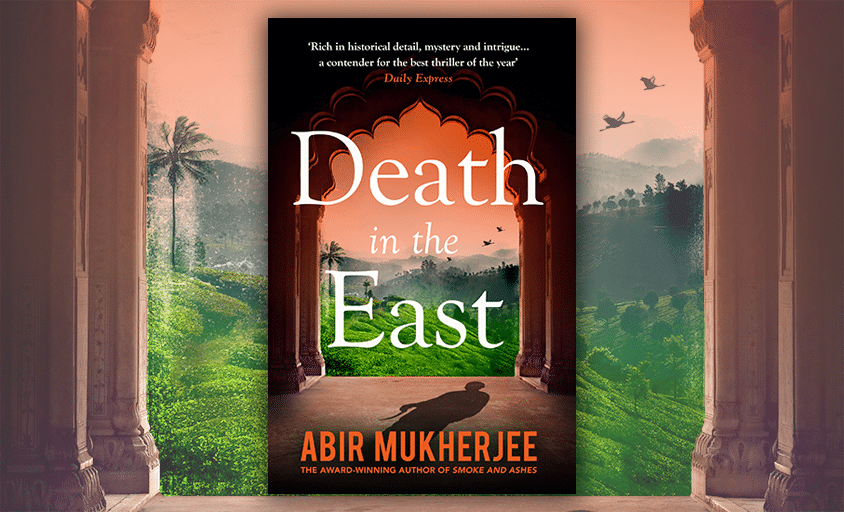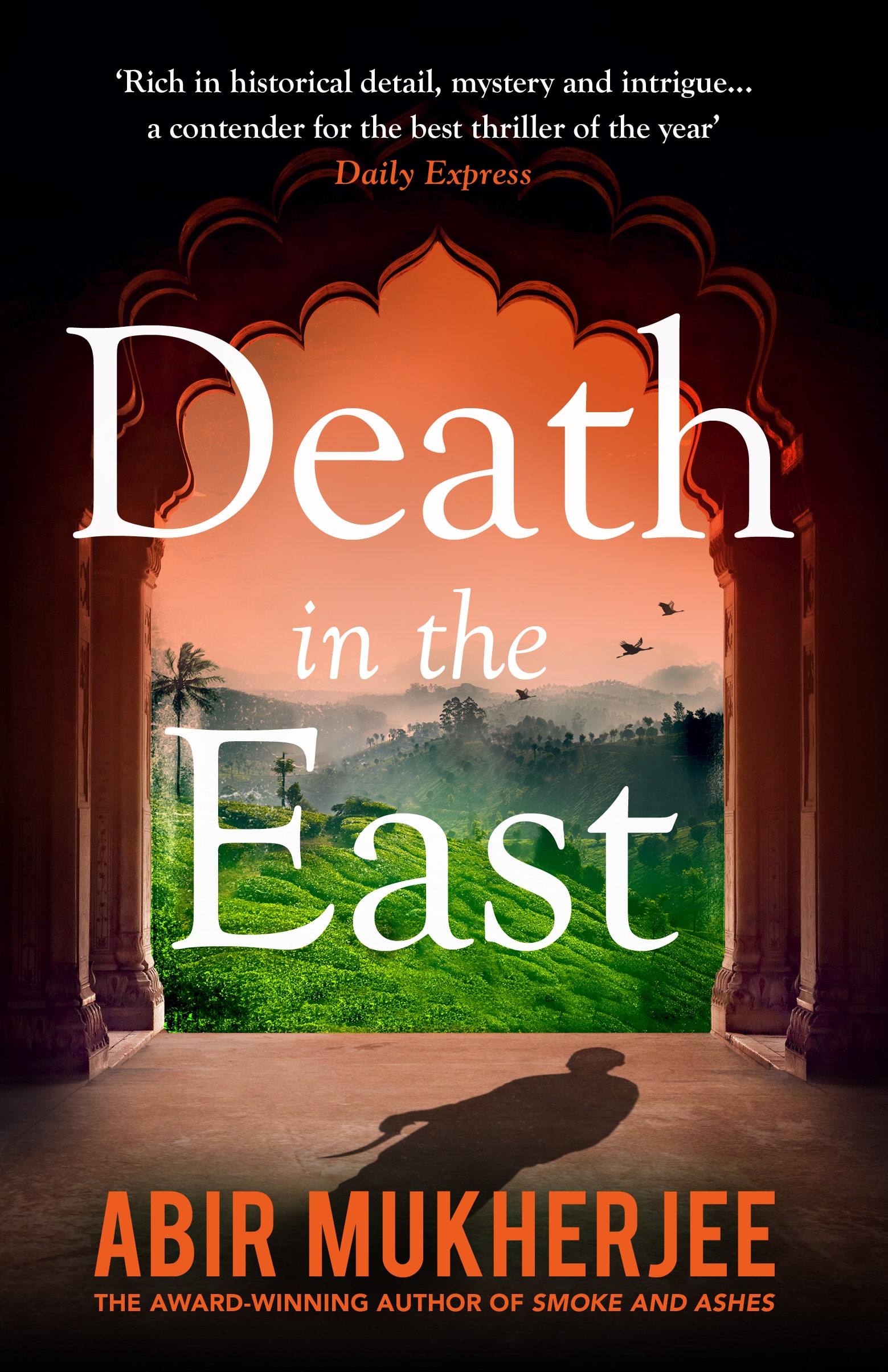Books
Extract: Death in the East by Abir Mukherjee
Death in the East is the fourth novel in Abir Mukherjee‘s award-winning Sam Wyndham historical mystery series. In this brilliantly crafted murder mystery, Calcutta police detective Captain Sam Wyndham and his quick-witted Indian Sergeant, Surrender-not Banerjee, are back for another rip-roaring adventure set in 1920s India.
1922, India. Leaving Calcutta, Captain Sam Wyndham heads for the hills of Assam, to the ashram of a sainted monk where he hopes to conquer his opium addiction. But when he arrives, he sees a ghost from his past – a man thought to be long dead, a man Wyndham hoped he would never see again.
1905, London. As a young constable, Sam Wyndham is on his usual East London beat when he comes across an old flame, Bessie Drummond, attacked in the streets. The next day, when Bessie is found brutally beaten in her own room, locked from the inside, Wyndham promises to get to the bottom of this. But the case will cost the young constable more than he ever imagined.
In Assam, Wyndham knows he must call his friend and colleague Sergeant Banerjee for help. He is certain this figure from his past isn’t here by coincidence, but for revenge…
Read on for an extract from Death in the East by Abir Mukherjee!
Death in the East
by
Abir Mukherjee
ONE
Two weeks earlier
I’d left Calcutta with a grim resolve, a suitcase-full of kerdū gourd, and, in case of emergencies, a bullet-sized ball of opium resin hidden between the folds of my clothes. My destination was an ashram in the Cachar hills, a forgotten backwater in a far-flung corner of the distant province of Assam, three days’ travel and a million miles from the sophistication, such as it was, of Calcutta. It had come, if not highly recommended, then at least loudly lauded, by my physician, Dr Chatterjee, a quack who specialised in Ayurvedic potions and whom I’d have dismissed as a charlatan had it not been for the fact that his remedies seemed to work. In hallowed tones, he’d explained that the place was run by a holy man called Devraha Swami, a 250-year-old sage who could cure most anything from acid reflux to yellow fever with nothing but a few herbs and a lot of prayer. It wasn’t much to pin one’s hopes on, but in my present situation I had little option. And as they say, a drowning man will clutch at a straw… or a herb.
The kerdū gourd had been Chatterjee’s suggestion too: smashed, mashed and mixed with a few other elements, it formed a pulp that when imbibed tasted like boot polish, but offered temporary respite from the opium pangs. I’d packed enough to last me the three-day journey – with some to spare, because when it came to rail transport, or anything else for that matter in India, nothing ever ran to schedule.
I’d arrived in the country almost four years earlier, sauntered off the boat at Kidderpore docks and straight into the first of a thousand opium dens. If that’s an exaggeration, it’s only slight, and I’d certainly found my first fix within a week of arrival.
I hadn’t come here an addict – an opium fiend – as the priests and the pedants called it. My use had been medicinal: a means of staunching nightmares and stimulating sleep. Addiction had come later, gradually, perniciously, and my realisation of the fact more slowly still.
I’d tried to wean myself off it. Who wouldn’t? After all, a policeman with an opium habit is like a long-distance runner with his laces tied together. You might manage to stay on your feet for a while, but sooner or later, you’re going to end up falling on your face.
And people notice when you fall.
Unfortunately for me, the people who’d noticed first had been the all-seeing men and women of Section H, the intelligence arm of the military, responsible for the political stability of the Raj. They tended to interpret their brief in the widest possible terms, which meant they spied on anyone and everyone, and that included me and my nocturnal pilgrimages to the wrong sort of temples.
For now they’d kept the information to themselves, less as a kindness and more as leverage to force me to dance to their tune. either way, there was no guarantee they wouldn’t change their minds and report it to my superiors, and the threat was there like a knife to my throat.
Not being overly keen on such blades, I’d decided to do something about it, hence my sojourn, first by rail and then road to the ashram of Devraha Swami.
*
The journey had started smoothly enough. I’d caught the Darjeeling Mail from Sealdah station to Santahar junction in the north of Bengal, hoping to make the connection to Guwahati, the capital of Assam. But the connection failed to turn up, due, apparently, to a flash strike by the ‘no-good bloody-awful’ native railway workers further up the line.
Faced with such adversity, I did what any self-respecting Englishman would do. I paid a railway urchin a few annas to direct me to the nearest alcoholic drink and climbed inside.
I spent the best part of a day cooling my heels and propping up the bar in a flyblown joint called Duncan’s Hotel where the beer was wet but the company sadly lacking. It’s no fun drinking alone, not much anyway, and when it came to comrades in ale, or comrades of any sort for that matter, I really only had one: my friend and junior officer, Sergeant Surrender-not Banerjee. He’d saved my life once but I didn’t hold that against him. Of course Surrendernot wasn’t his real name. Indians didn’t go in for stiff-upper-lip Victorian nomenclature, not when it came to naming their children at least. His real name was Surendranath, which was difficult to pronounce, and so everyone called him Surrender-not. Everyone British at any rate.
Surrender-not, however, was on his way to Dacca, Bengal’s second city, situated in the arse end of the province and separated from Calcutta by two hundred miles and half the Ganges delta. He was off to his aunt’s house, to seek refuge from the torrid independence fever that had infected Calcutta’s native populace and divided families down the middle, setting brother against brother, father against son.
Half a day in and I was already missing him, mainly, I realised, because over the last six months we’d spent hardly any time just sitting and having a drink like we used to do in the days when I’d first arrived, when Calcutta was new and shining and the opium was my servant and not my master. I sat at the bar in Duncan’s Hotel and raised a glass to him in tribute, which was ironic, given his tolerance for alcohol was on a par with that of the average English schoolgirl.
At dusk, the urchin returned with news of the arrival of the Assam Mail and I followed him back out the door, still none the wiser as to who Duncan was, or had been, or what terrible madness had possessed him to put up his hotel here in the middle of nowhere.
Any relief I derived from finally being aboard the Assam Mail evaporated upon the realisation that I could probably have walked to Guwahati faster than the little narrow-gauge train was trundling. Nevertheless, as the geriatric locomotive groped its way ponderously through the darkness, I attempted the impossible and tried to make myself comfortable on the stiff wooden benches of the second-class carriage that would be my home for the night.
A red sun was rising by the time the train pulled into its platform in the Assamese capital, light enough for me to watch my connecting train to Lumding puff merrily out of the station. Another man might have waited for the next train, but that man probably didn’t have a couple of kerdū gourds rotting in his suitcase. Instead I waylaid a lorry driver and paid him to ferry me hell for leather to the next station up the line, arriving there just as the platform guard was about to blow his whistle.
Lumding arrived nine hours later, by which time I and my stock of kerdū gourd were close to exhaustion. I fell off the train and into the fragrant, multicoloured mayhem of Indian provincial life, with its traders and travellers, its station hawkers, crying out their wares with the urgency of Seventh-Day Adventists proclaiming the second coming, and its market-bound smallholders doubled over like beasts of burden with their produce, their livelihoods, weighing on their narrow backs. There were even a few red-cheeked, baby faced colonial officials, each freshly minted and making his solitary way upcountry, to some remote outpost to take up his station as the only white authority within a fifty-mile radius.
And it was on the platform that it happened. That thunderclap of shock. The electric bolt of fear. For a heartbeat, no more than an instant, I saw a ghost: a dead man; a man I’d last seen almost twenty years before. His eyes bored into me from across the concourse, older, time-ravaged, but with the same cold, unwavering stare. Time plays tricks on the memory, but it’s hard to forget the face of a man who’s tried to kill you.
Cold sweat trickled down my collar. I told myself I was mistaken: deceived by the light, a casualty of exhaustion, a victim of the O – willing to accept anything except the evidence before me. Maybe that’s why I just stood there dumbstruck.
A second later he was gone, just one more eddy in a sea of bodies. I came to my senses in a panic and, head pounding, grabbed my suitcase and gave chase, shoving my way through the crowd and still not fully trusting of either eyes or memory. I pushed aside protesting bodies and caught a glimpse of a linen-suited back making for the exit before losing him once more in the throng.
I ran on, now breathless and sweat-soaked, and emerged onto the station steps just in time to see him disappear into a large, black motor car that had been waiting with its engine idling. I watched as a porter loaded his valise and a white-clad chauffeur revved the engine. As it moved off, I caught one last silhouetted glimpse of the man in the back. I told myself it was impossible. here, now, in this remotest of corners, could it really be that I was staring at a man who’d got away with murder, a man who’d also tried to kill me? He’d come pretty close too.
I shivered and looked on helplessly as the car sped off. The aching in my head and bones grew stronger and I doubled over in pain. I told myself it was nonsense: an aberration, a paranoid delusion, a hallucination – call it what you will – and that the figure had been someone else, just another trader or tax inspector or tea planter going about his business. After all, I’d had opium-induced hallucinations before, though nothing like this. Never anything so tangible. So vivid. What’s more, they’d always occurred when I’d been under the influence and in the seclusion of some opium den; never as now, knee-deep in a sea of people. And while the thought that after all these years I should suddenly hallucinate about a long-dead murderer was perplexing, what really terrified me was the fear that I might be descending into madness.
Enjoyed this extract from Death in the East by Abir Mukherjee? Let us know in the comments below!
1 Comment
Join the discussion
Please note: Moderation is enabled and may delay your comment being posted. There is no need to resubmit your comment. By posting a comment you are agreeing to the website Terms of Use.



I have read all previous Wyndham novels by Abir Mukherjee and have thoroughly enjoyed them. Now I am looking forward to Death in the East which I already have preordered.